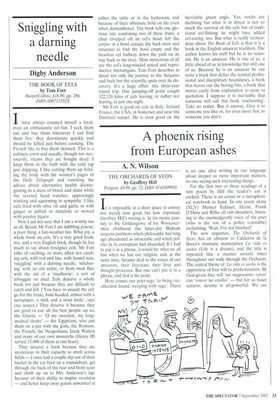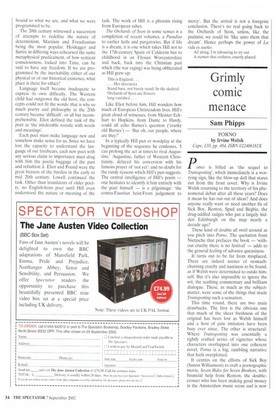A phoenix rising from European ashes
A. N. Wilson
THE ORCHARDS OF SYON by Geoffrey Hill Penguin, £9.99, pp. 72 ISBN 0141009918 It is impossible in a short space to convey not merely how good, but how important Geoffrey Hill's writing is. In his mystic journey to the Goldengrove of his Worcestershire childhood this latter-day Blakean reopens problems which philosophy had long ago abandoned as intractable and which politics in its corruption had discarded. If I had to put it in a phrase, it would be: what we all lost when we lost our religion, and, at the same time, became deaf to the voices of our ancestors, their literature, their lives and thought-processes. But one can't put it in a phrase, and that is the point.
Here comes our poet-sage `to bring recollection found, weeping with rage'. There is no one alive writing in our language about deeper or more important matters, no one saying such interesting things.
For the first two or three readings of a new poem by Hill the reader's ear is cocked. There is an actual or a metaphorical notebook to hand. In one poem alone (XLV) Meister Eckhart, Heine, Frank O'Hara and Rilke all rub shoulders, listening to the curmudgeonly voice of the poet (who is the son of a police constable) exclaiming, `Wait, I've not finished!'
The new sequence, The Orchards of Syon, has an allusion to Calderon de la Barca's dramatic masterpiece La vida es suetio (Life is a dream), and the title is repeated like a mantra several times throughout our walk through the Orchards. The central theme of La vida es suefia is the opposition of free will to predestination. By God-given free will 'tin magnanimo varon' can 'veneer las estelles' — but for us baser natures, destiny is all-powerful. We are
bound to what we are, and what we were programmed to be.
The 20th century witnessed a succession of attempts to redefine the nature of determinism, Marxism and Freudianism being the most popular. Heidegger and Sartre in differing ways rehearsed the same metaphysical predicament, of how sentient consciousness, locked into Time, can be said to have any freedom. If we are programmed by the inevitability either of our physical or of our historical existence, what place is there for ethics?
Language itself became inadequate to express its own difficulty. The Western child had outgrown the old boot, the concepts could not fit the words: that is why so much poetry and philosophy in the 20th century became 'difficult', or all but incomprehensible. Eliot defined the task of the poet as 'the intolerable wrestle with words and meanings'.
Each poet must make language new and somehow make sense for us. Since we have lost the capacity to understand the language of our forebears, each new poet with any serious claim to importance must drag with him the poetic baggage of the past and refashion it. Eliot and Pound were the great bearers of the burden in the early to mid 20th century. Lowell continued the task. Other than translators of older poetry. no English-born poet until Hill even understood the nature or meaning of the task. The work of Hill is a phoenix rising from European ashes.
The Orchards of Syon in some senses is a completion of recent volumes, a Paradiso to earlier hells and purgatories. But if life is a dream, it is one which takes Hill not to the 17th-century Spain of Calderon but to childhood in an Elysian Worcestershire and back, back into the Christian past which (the war raging) was being obliterated as Hill grew up:
This is England ..
. .. Her decencies Stand bare, not barely stand. In the skeletal Orchards of Syon are flowers long vanished. .
Like Eliot before him, Hill wonders how much of European Christendom lives. Hill's great cloud of witnesses, from Meister Eckhart to Hopkins, from Dante to Hardy, could all echo Barnes's question ('cranky old Barnes') — 'But oh, our people, where are they?'
In a typically Hill pun or wordplay at the beginning of the sequence he confesses, 'I can prolong the act at times/to rival Augustine.' Augustine, father of Western Christianity, delayed his conversion with his famous prayer of 'not yet': and no doubt for the randy reasons which Hill's pun suggests. The central intelligence of Hill's poem — one hesitates to identify it/him entirely with the poet himself — is a pilgrimage: 'the contra-Faustian heist/From judgement to
mercy'. But the arrival is not a foregone conclusion. There's no real going back to the Orchards of Syon, unless, like the psalmist, we could be 'like unto them that dream'. Hence perhaps the power of La vida es sueno:
All along, I'm labouring to try out A numen that endures, exactly placed.



























































 Previous page
Previous page